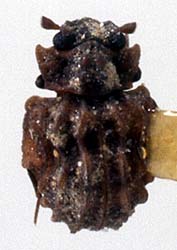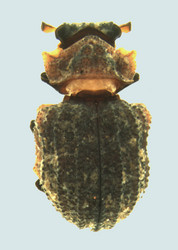Lepiceridae
Toadlet Beetles
William Shepard


This tree diagram shows the relationships between several groups of organisms.
The root of the current tree connects the organisms featured in this tree to their containing group and the rest of the Tree of Life. The basal branching point in the tree represents the ancestor of the other groups in the tree. This ancestor diversified over time into several descendent subgroups, which are represented as internal nodes and terminal taxa to the right.

You can click on the root to travel down the Tree of Life all the way to the root of all Life, and you can click on the names of descendent subgroups to travel up the Tree of Life all the way to individual species.
For more information on ToL tree formatting, please see Interpreting the Tree or Classification. To learn more about phylogenetic trees, please visit our Phylogenetic Biology pages.
close boxIntroduction
Lepiceridae is one of the smallest of beetle families, with only four species. Two common names have been used for the family – the toadlet beetles and the false minute mud-loving beetles. For such a small group Lepiceridae has seen a number of taxonomic problems. The family has also been called Cyathoceridae, based on the type genus Cyathocerus Sharp 1882. Sharp was unaware of the earlier description of Lepicerus Motschulsky 1855. Unfortunately Motschulsky erroneously put Lepicerus in Georissidae. In 1878 Eichhoff described the genus Lepicerus in Scolytidae. Hinton (1936) changed that scolytid genus to Lepicerinus, which has since been recently synonymized under the scolytid genus Scolytogenes Eichhoff 1878. Lastly, Kirejtshuk and Poinar (2006) described a fossil lepicerid, Haplochelus georissoides, but put it in the new family Haplochelidae. Lawrence has since considered it as a true lepicerid (pers. com.).
Lepicerus Motschulsky has since its description been erroneously listed in Georissidae or likened to georissids. This can only be due to the briefest of examination of its form and/or the similarity of the habitat of Lepicerus inaequalis and georissids. Morphologically no one could confuse these two groups. And newer habitat information finds only the smallest of similarities.
Available habitat information for Lepicerus shows a gradient of sites from wet stream banks (L. inaequalis) to dry cypress woodlands (L. bufo) to dry plantain fields (L. pichilingue) (Shepard et al. 2005; Navarrete-Heredia et al. 2005; Flowers et al. 2010). This differs from most myxophagans which have more aquatic habitats. Collections of Lepicerus spp. have been from 128-1427 m in elevation. All extant lepicerids are Neotropical, occurring from Mexico southward to Venezuela and Ecuador. Haplochelus georissoides is from Burmese amber.
Lepiceridae is notable in that it is one of the very few beetle families for which no larva has been formally described. One presumed lepicerid larva exists (J. Lawrence, pers. com.).
Characteristics
There is little morphological variation in the family, even when considering the fossil species H. georissoides. Morphological descriptions are in Sharp 1882; Reichardt 1976; Shepard et al. 2005; Navarrete-Heredia et al. 2005; Beutel 1999; and Arce-Perez et al. 2005. Lepicerid adults can be recognized by the following characters:
- Small size – 2 mm or less
- Heavily sclerotized body
- Antennae with few segments (4-7); terminal segment conical and apically truncate
- Mouthparts hidden
- Elytra heavily punctuate and carinate
- Elytral epipleuron strongly sinuate dorsoventrally
- Tarsi one-segmented
- Abdomen with 7 visible sternites
Discussion of Phylogenetic Relationships
The only published phylogeny that includes lepicerids (Beutel 1999) has Lepicerus as a sister group to (Hydroscaphidae + Torridincolidae).
Other Names for Lepiceridae
- Cyathoceridae
- Haplochelidae
- Cyathocerus
- Vernacular Names: Toadlet Beetles, false minute mud-loving beetles
References
Arce-Pérez, R., J. L. Navarrete-Hereida and R. G. Beutel. 2005. 6.1. Lepiceridae Hinton, 1936 (= Cyathoceridae). Page 45. In: Beutal, R. G. and R. A. B. Leschen (eds.). Coleoptera, Beetles. Volume 1: Morphology and Systematics (Archostemata, Adephaga, Myxophaga, Polyphaga partim). Handbook for Zoology. Walter de Gruyter. Berlin, New York.
Beutel, R. G. 1999. Phylogenetic analysis of Myxophaga (Coleoptera) with a redescription of Lepicerus horni (Lepiceridae). Zoologischer Anzeiger 237 (1998/99): 291-308.
Eichoff, W. J. 1878. Ratio, descripto, emendatio corum Tomicinorum qui sunt in Dr. Medin. Chapuisi et authoris ipsius collectionibus et quos praeterea recognovit. Mem. Soc. Roy. Sci Liege, ser. 2, 8: 1-531.
Flowers, R. W., W. D. Shepard and R. T. Mera. 2010. A new species of Lepicerus (Coleoptera: Lepiceridae) from Ecuador. Zootaxa 2639: 35-39.
Hinton, H. E. 1934. Two coleopterous families new to Mexico. Pan-Pacific Entomologist 9: 160-162.
Hinton, H. E. 1936. XLVI.--Lepiceridae-a new name for the Cyathoceridae. Lepicerinus—a new name for the scolytid genus Lepicerus Eich. (Coleoptera). Annals and Magazine of Natural History, 10th Series 17(No. 100): 472-474.
Kirejtshuk, A. G. and G. Poinar. 2006. Haplochelidae, a new family of Cretaceous beetles (Coleoptera: Myxophaga) from Burmese amber. Proceedings of the Entomological Society of Washington 108(1): 155-164.
Motschulsky, V. 1855. Voyages. Lettré de M. de Motschulsky á M. Ménétriés. No. 2. Etudes entomologiques 4: 1-84.
Navarrete-Heredia, J. L., J. Cortés-Aguilar and R. G. Beutal. 2005. New findings on the enigmatic beetle family Lepiceridae (Coleoptera: Myxophaga). Entomologische Abhandlungen 62(2): 193-201.
Reichardt, H. 1976. Revision of the Lepiceridae (Coleoptera, Myxophaga). Papeis Avulsos de Zoologia 30: 35-42.
Sharp, D. 1882. Cyathoceridae. Coleoptera. Biologia Centrali-Americana 2: 141-144.
Shepard, W. D., R. E. Roughley and W. Porras. 2005. The natural history of Lepicerus inaequalis Motschulsky (Coleoptera: Myxophaga: Lepiceridae) in Costa Rica, and additional morphological descriptions. Folia Entomologica Mexicana 44 (Supplement 1): 97-105.
Title Illustrations

| Scientific Name | Lepicerus bufo |
|---|---|
| Image Use |
 This media file is licensed under the Creative Commons Attribution License - Version 3.0. This media file is licensed under the Creative Commons Attribution License - Version 3.0.
|
| Copyright |
© 1996 David R. Maddison

|
| Scientific Name | Lepicerus inaequalis |
|---|---|
| Image Use |
 This media file is licensed under the Creative Commons Attribution License - Version 3.0. This media file is licensed under the Creative Commons Attribution License - Version 3.0.
|
| Copyright |
© 1996 David R. Maddison

|
About This Page

Univerrsity of California, Berkeley
Correspondence regarding this page should be directed to William Shepard at
Page copyright © 2010
 Page: Tree of Life
Lepiceridae. Toadlet Beetles.
Authored by
William Shepard.
The TEXT of this page is licensed under the
Creative Commons Attribution-NonCommercial License - Version 3.0. Note that images and other media
featured on this page are each governed by their own license, and they may or may not be available
for reuse. Click on an image or a media link to access the media data window, which provides the
relevant licensing information. For the general terms and conditions of ToL material reuse and
redistribution, please see the Tree of Life Copyright
Policies.
Page: Tree of Life
Lepiceridae. Toadlet Beetles.
Authored by
William Shepard.
The TEXT of this page is licensed under the
Creative Commons Attribution-NonCommercial License - Version 3.0. Note that images and other media
featured on this page are each governed by their own license, and they may or may not be available
for reuse. Click on an image or a media link to access the media data window, which provides the
relevant licensing information. For the general terms and conditions of ToL material reuse and
redistribution, please see the Tree of Life Copyright
Policies.
- First online 20 October 2010
- Content changed 20 October 2010
Citing this page:
Shepard, William. 2010. Lepiceridae. Toadlet Beetles. Version 20 October 2010 (under construction). http://tolweb.org/Lepiceridae/108334/2010.10.20 in The Tree of Life Web Project, http://tolweb.org/











 Go to quick links
Go to quick search
Go to navigation for this section of the ToL site
Go to detailed links for the ToL site
Go to quick links
Go to quick search
Go to navigation for this section of the ToL site
Go to detailed links for the ToL site